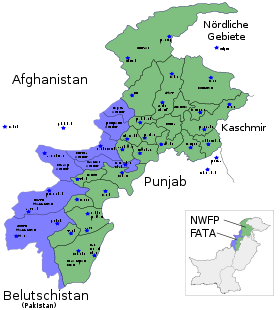Federally Administered Tribal Areas
![]()
This article or section is still missing the following important information:
article does not at all do justice to the importance of the area: it lacks information on the political and military situation, activities of the Taliban and al-Qaida, etc.
Help Wikipedia by researching and adding them.
The tribal areas under federal administration, (Pashto وسطي قبایلي سیمې، منځنۍ پښتونخوا; Urdu وفاقی منتظم شدہ قبائیلی علاقہ جات) also referred to as Federally Administered Tribal Areas or FATA for short, were a Pakistani special territory taken over by the Pakistani government from the British virtually after the creation of the state in 1947. The Federally Administered Tribal Areas and the province of Khyber Pakhtunkhwa were called Eastern Afghanistan or Pashtunistan by the Afghans.
On March 2, 2017, the Pakistani government under Prime Minister Nawaz Sharif announced its intention to gradually incorporate the tribal areas into the bordering northwestern province of Khyber Pakhtunkhwa. The incorporation was expected to take about 5 years. Proponents of such a move hoped the move would lead to better economic and cultural development of the backward region. Opponents of the reform spoke of curtailing the previous freedoms of the residents. After the National Assembly of Pakistan voted in favour of merging the tribal areas with the province of Khyber Pakhtunkhwa on 24 May 2018 and this was confirmed by its provincial assembly on 27 May 2018, President Mamnoon Hussain signed the amending law dissolving the territory on 31 May 2018.
The areas are inhabited by Pashtuns, the ethnic group that is also the largest ethnic group in Afghanistan. Parts of the former tribal areas are under the control of al-Qaeda and the Pakistani Taliban.

Map of tribal areas and Khyber Pakhtunkhwa (by 2018): Federally Administered Tribal Areas (FATA) Khyber Pakhtunkhwa (formerly NWFP)
Administration breakdown
The administration of the tribal areas distinguished two categories, depending on the size and population level. The areas in the "Agency" category had their own administrative headquarters and enjoyed greater autonomy. The areas in the "Adjoining Tribal Areas" category were administered from the respective district capital in Khyber Pakhtunkhwa, after which they were also named:
| tribal agency | km² | Population | Administrative headquarters |
| Bajaur Agency | 1.290 | 596.700 | Khar |
| Khyber Agency | 2.576 | 534.400 | Peshawar |
| Kurram Agency | 3.380 | 441.600 | Parachinar |
| Mohmand Agency | 2.296 | 331.600 | Ghallanay |
| North Waziristan Agency | 4.707 | 357.900 | Miranshah |
| Orakzai Agency | 1.538 | 223.900 | Kalaya |
| South Waziristan Agency | 6.620 | 413.900 | Wana |
| Adjoining Tribal Area (Frontier Region) | |||
| Tribal Area Adj. Bannu District | 0.745 | 019.600 | Bannu |
| Tribal Area Adj. Dera Ismail Khan District | 2.008 | 039.400 | D.I.Khan |
| Tribal Area Adj. Kohat District | 0.446 | 090.800 | Kohat |
| Tribal Area Adj. Lakki Marwat District | 0.132 | 007.000 | Lakki |
| Tribal Area Adj. Peshawar District | 0.261 | 053.900 | Peshawar |
| Tribal Area Adj. Tank District | 1.221 | 027.300 | Jandola |
Geography
The tribal areas bordered the provinces of Khyber Pakhtunkhwa (east), Punjab (southeast) and Balochistan (south), as well as Afghanistan (west).
Search within the encyclopedia